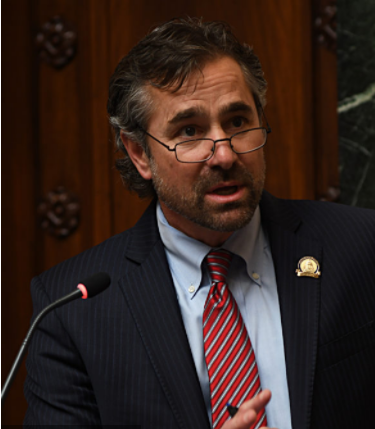
Kentucky GOP Rep. Chad McCoy sponsored House Bill 9, which would establish permanent funding for charter schools.
Calling them “wrong for our commonwealth,” Kentucky Gov. Andy Beshear on Thursday vetoed a bill that would establish funding needed to launch public charter schools.
“I’m against charter schools,” the Democratic governor said at his weekly news conference where he fulfilled his pledge to veto House Bill 9, which passed both chambers of the Legislature by thin margins. “They take taxpayer dollars away from already underfunded schools in the commonwealth.” A Republican priority, the bill would set up long-term funding for charter schools. Public charters, like district schools, would receive a mix of state and local tax support.
The bill would also require that at least two charter schools be created under pilot projects, one in Louisville and the other in northern Kentucky.
The veto drew strong criticism from one of the nation’s largest charter school groups.
“We are deeply disappointed in Governor Beshear. He is clearly letting his ties to special interest groups interfere with his duty to best serve Kentucky students and families,” said Todd Ziebarth, senior vice president of state advocacy and support for the National Alliance for Public Charter Schools. “Many studies and overwhelming parent demand prove public charter schools work for millions of families across the country. Kentucky’s charter school law has been on the books since 2017, and it is time to permanently fund these unique, innovative public schools.”
The National Alliance is urging the Kentucky Legislature to stand strong for Kentucky students and override the veto.
The Kentucky Legislature authorized charter schools in 2017, but none were created because lawmakers created no permanent funding mechanism. House Bill 9 was an attempt to do that.
The bill was sponsored by Rep. Chad McCoy, R-Bardstown, who last year sponsored a bill that created a $25 million tax credit scholarship fund giving eligible families the ability to pay for private school tuition, tutoring and other educational expenses. The bill also gave families the option to choose a different public school district. McCoy discussed the bill on a reimaginED online podcast last year.
Beshear also vetoed that bill. The Legislature overrode the veto, but the new law now faces a court challenge from the Council for Better Education, which opposes education choice.
“This is another option for our public schools to give parents a choice, to send their kids somewhere that the parent thinks is a better option for their child,” McCoy said during a debate.
The goal is that the pilot projects "show the rest of the state there’s nothing to be afraid of,” he said.
During his veto announcement, the governor warned that if passed, the bill would likely prompt a court challenge. Like other charter school opponents, he also claimed they divert money from traditional district schools into charter schools, which he says lack oversight and accountability.
Not true, supporters argue. According to a report last year by the Fordham Institute, in most states an increase in the percentage of students attending independent charter schools was associated with a significant increase in their host districts’ total revenue per pupil, total spending per pupil, local revenue per pupil, and per-pupil spending on support services.
Kentucky lawmakers will have a chance to override the veto of HB 9 when they reconvene next week for the final two days of this year's legislative session. The charter schools bill splintered the GOP ranks, with 22 House Republicans joining Democrats to oppose the proposal last month. Kentucky is one of six states that require only a simple majority in each chamber to override a veto.